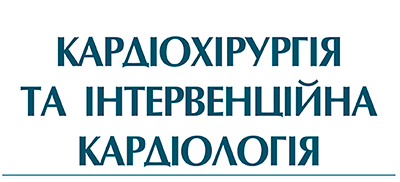Original research
DOI:http://doi.org/10.31928/2305-3127-2023.3-4.515
Patient selection criteria for transcatheter implantation of aortic valve
M.B. Todurov 1
O.V. Zelenchuk 1, 2 ![]() 0000-0002-5677-9311
0000-0002-5677-9311
A.V. Khokhlov 1, 2 ![]() 0000-0003-1688-0500
0000-0003-1688-0500
M.V. Stan 1, 2
N.O. Yashchenko 1, 2
1 Shupyk National Health Care University of Ukraine, Kyiv, Ukraine
2 Heart Institute of the Ministry of Health of Ukraine, Kyiv, Ukraine
The aim – to conduct a literature review, analyze and, based on our own results, present an algorithm for choosing the tactics of surgical treatment of patients with severe aortic stenosis.
Materials and methods. In this prospective study, the medical records of adult patients (from 18 years of age) who underwent surgical or transcatheter aortic valve replacement at the Heart Institute of the Ministry of Health of Ukraine, between 2018 and 2023 were analyzed.
Results. The algorithm for the selection of surgical treatment of patients included in the study was built based on a thorough analysis of the anamnesis, clinical, laboratory and instrumental examination data. An important stage in choosing the optimal surgical tactics is the assessment of the development of intraoperative and postoperative complications according to the EuroSCORE and STS SCORE scales, which are most widely used in cardiac surgery practice and allow predicting the complicated course of the early postoperative period in patients with acquired valvular heart defects. Although there is an increasing trend towards TAVI in younger, lower-risk patients, the more frequent possibility of residual paravalvular insufficiency and the need for permanent pacemaker implantation should be considered. As the experience of interventional cardiologists increases and new valve designs and delivery systems are developed, better clinical outcomes and lower complication rates can be expected, which will contribute to the expansion of indications for TAVI.
Conclusions. Today, TAVI remains the only way to correct aortic valve defects for inoperable patients with severe symptomatic aortic stenosis. Based on the results of several randomized controlled trials, TAVI is associated with a much lower rate of postoperative complications and a faster recovery, and should be the method of choice in all high surgical risk patients and a competitive alternative to aortic valve replacement in intermediate risk patients.
Key words: TAVI, transcatheter aortic valve implantation, aortic valve stenosis, biological prosthesis, aortic valve prosthetics
| [PDF] | [References] |








